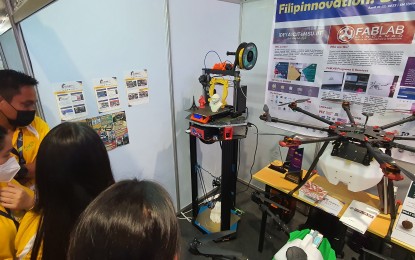
3D FUTURE. Guests inspect several 3D printers and other mechanical innovations such as the drone seeder during the opening of Innovation Day Thursday (April 21, 2022) in Cagayan de Oro City. The Innovation Day is organized by the government and the private sector under the Regional Research Development and Innovation Committee in Northern Mindanao. (PNA photo by Nef Luczon)
CAGAYAN DE ORO CITY – Northern Mindanao's 3D printing industry is relatively new, its adoption being hampered by misconceptions that it's an expensive technology.
At least this was the impression that Joseph Gaston had when he started his 3D printing business in 2020, at the height of a global pandemic.
Gaston, a mechanical engineering graduate of Xavier University Ateneo de Cagayan, said the 3D printing industry is an emerging sector that has many practical uses for businesses and even for the academe.
"They thought it's very expensive, but with the growing number of 3D printing (services in the country), we now know that it is actually affordable," he said Thursday during the sidelines of an exhibition featuring the latest mechanical innovations.
Gaston's primary motivation is to incorporate 3D printing to make learning more accessible for future generations, starting with making these machines available in local schools.
Two years ago, Gaston began his startup business, the ZYX 3D Printing Hub, at his residence. His first loyal clients were university students.
"These students have research projects or theses that require 3D modeling; some were for cosplay (costume plays)," he said.
Fab Lab Mindanao
Gaston's interest in 3D printing started when he began tinkering with 3D drawings in his fifth grade. This curiosity would peak when he interned at Fab Lab Mindanao four years ago.
Fab Lab Mindanao is an innovation and invention center of the Mindanao State University-Iligan Institute of Technology (MSU-IIT).
It incubates the business potentials of Micro, Small, and Medium Enterprises (MSMEs) by utilizing science and technology research, among which is the crafting of prototypes for the clients' designs.
After his experience there, Gaston managed to buy his first 3D printer worth PHP10,000 with the help of his siblings.
"Most of the printers and raw materials come from China, but there are already resellers who are based in Manila," he said.
As to the raw materials, Gaston said China remains cheaper compared to European countries.
'Filipinnovation'
FabLab Mindanao is one of the exhibitors of the National Innovation Day (NID) held at SM Mall of this city from April 21 to 22.
With the theme "Filipinnovation: Unlocked," local MSMEs and academic institutions showcased recent innovations that have found adoption in the regional business sector. Other products on exhibit also tout their commercial potentials.
Gaston's experience from the laboratory to the actual application through his startup made him a success story for FabLab.
Mylah Faye Aurora Cariño, director of the National Economic Development Authority in Northern Mindanao, said government-private industry partnerships are important to help MSMEs and researchers explore new innovative endeavors to help improve the business communities.
"That's why the government's role is to get our innovators (be provided) of the right (working) environment, police, and financial support," Cariño.
Almer Masillones, Misamis Oriental director of the Department of Trade and Industry, said she believes that 3D technology can help the MSMEs in the region.
"It (innovation) is seen to address the problems of our MSMEs, our challenges in the industry. Innovation will create better products, and better services by utilizing existing resources," Masillones pointed out.
In a recent statement, the Department of Science and Technology Region 10 (DOST-10) underscored the importance of an innovation-driven economy.
DOST-10 said it funded PHP1.3 million worth of research and development funds to the University of Science and Technology of Southern Philippines (USTP) to provide optimized routes for location drop-off and pick-up using genetic algorithms.
One of its technology adopters is Dirt Bag, a startup offering digital laundry services and currently an industry partner in the project.
The project output will serve as an additional feature in the existing Dirt Bag mobile application to provide optimized routes for their delivery drivers.
3D future
For Gaston, the local 3D printing sector has yet to fully mature, and that many aspects can still be improved. For one, he said managing a full-scale 3D printing enterprise remains a challenge.
“Since it is a developing field there are so many things to learn, and I have to keep up with and optimize printers to the max,” he said.
Gaston said he was delighted that more people have found an interest in 3D printing, which encouraged him to go beyond providing products and services and to become someone eager to help and train other aspirants in the field. (PNA)
